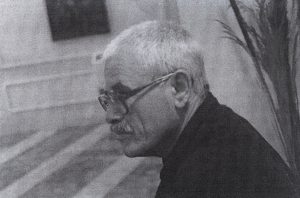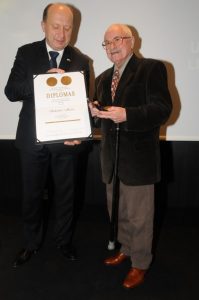Icchokas Meras
 Meras was born in 1934 to Jehuda and Miriam Meras in a Jewish family in Kelmė, Lithuania, which contained one of the country's notable Jewish communities. His family perished in 1941 when the Nazis undertook the liquidation of Lithuania's Jews, but young Icchokas escaped the Holocaust. "On July 28, 1941, I was being taken to a ditch to be shot," he wrote later. "Due to chance, they decided to return some of the children. Due to another chance, I fell in with people who valued the life of a seven-year old child."
Meras was born in 1934 to Jehuda and Miriam Meras in a Jewish family in Kelmė, Lithuania, which contained one of the country's notable Jewish communities. His family perished in 1941 when the Nazis undertook the liquidation of Lithuania's Jews, but young Icchokas escaped the Holocaust. "On July 28, 1941, I was being taken to a ditch to be shot," he wrote later. "Due to chance, they decided to return some of the children. Due to another chance, I fell in with people who valued the life of a seven-year old child."
Hidden and adopted by a Lithuanian peasant family, Meras survived the war. In the violent and troubled post-war years Meras attended secondary school and soon revealed an inclination towards writing when he came to work for a local newspaper in Kelmė.
In 1958 he graduated from the Kaunas Polytechnic Institute with a degree in radio electronics, but began devoting most of his spare time to literature. In 1960 Meras published his first collection of stories entitled Geltonas lopas (The Yellow Patch). He based his sketches on his own childhood experiences of Holocaust terror. In 1963 Meras published two works: Žemė visada gyva (The Earth is Always Alive) and his best-known work internationally, Lygiosios trunka akimirką (A Stalemate Lasts But a Moment). In 1965 Meras published another novel, Ant ko laikosi pasaulis (What the World Rests On). In 1971 there followed Mėnulio savaitė (The Week of the Moon) and Senas fontanas (The Old Fountain). In 1971 Meras presented his darkly existentialist novel Striptizas, arba Paryžius — Roma — Paryžius (Striptease or Paris-Rome-Paris). This work was published in literary monthly magazine Pergalė and was roundly criticised by Communist party officials.
Under increasing pressure from the KGB authorities for his literary "deviations," he emigrated from Lithuania to Israel in 1972 where he lived until his death.
Awards and recognition:
- Lithuania: Lithuanian National Prize (2010).
- Lithuania: Commander's Cross of the Order of Gediminas (1995)
From: Wikipedia
He did not understand why it was forbidden to bring flowers to the ghetto / Ofer Aderet, Haaretz, 28/3/2014
Icchokas Meras, whose novels have been translated into dozens of languages, won the Lithuanian National Prize, but was forced to teach electricity in a high school in Lod. "How long, how much strength remains afterwards for spiritual creation," he wondered. He owed his life to the Lithuanians who adopted him after his parents were murdered.
The death of Icchokas Meras from Tel Aviv reverberated in his native Lithuania. The Lithuanian President, Prime Minister, the Government and the MPs sent their condolences to the Meras family. The Lithuanian media reported extensively on his death. "Every Lithuanian mourned his passing," said Darius Degutis, the Lithuanian Ambassador in Israel.
The novels and short stories he authored have been translated into dozens of languages and have won him some of the most important awards in his country of birth, including the Lithuanian National Prize. He was also recognized in Israel: he received the Zalman Shazar Prize for Literature in 1973 and the President's Prize for Literature in 1998.
He was born to a traditional Zionist family in the town of Kelmé in Lithuania, known for its yeshiva. About 2,000 Jews lived in Kelmé during the German occupation in 1941. In the summer, they were murdered by Lithuanian nationalists. Meras' parents were also among those killed.
Meras was eight years old at the time. Only by a miracle did he escape being shot. Later, a group of Lithuanian women brought food to him and other orphaned children, and managed to rescue some of them. Meras and his sister found refuge with their housemaid who had them baptized as Christians.
When the authorities discovered them, they were taken to a camp where Jews from the area were held, but managed to escape from there as well. Meras drifted from one adoptive family to another, until he found himself in the street once again. He was found by Juozas and Bronislava Dainauskas, who adopted him as their seventh son. He found shelter, love and compassion in their home until the end of the German occupation. In 2004, Yad Vashem recognized the couple and their son Patras as Righteous Among the Nations.
He studied radio electronics after the war, and later worked in Lithuania as director of an electronic devices laboratory. He then started combining literary writing with his work.
He published his first novel, the "Yellow Patch" in 1960 where he describes his childhood. He published six more books in Lithuania before making aliyah to Israel. He published more books in Israel. Their recurring theme is the Holocaust.
In his book "Stalemate with Death," first translated into Hebrew in 1970 (Otpaz publishers), he describes the experiences of a Jewish family in the ghetto, and the love story of a boy and a girl within its walls. He wrote: "In our ghetto, there are no flowers anywhere. Flowers are forbidden. It is also forbidden to bring them here. Why is it forbidden to bring flowers? I think about it a while but can't understand it. Even if I were the greatest villain in the world, I would allow people to grow flower in spite of it all. Even if I were the greatest villain in the world and would forbid people to grow flowers, I would still allow them to bring flowers from the fields and pastures on their way back from the labor camp."
In 1972 he made aliyah to Israel with his family, and settled in Holon. In 1974, he was elected Chairman of the Association of Immigrants of the Soviet Union. He also served as chairman of the Association of Russian-speaking Writers in Israel and was a member of the Board of the Public Council for Culture and the Arts. From 1976 to 1998 he was a high school teacher of electricity and electronics, and at the ORT High School in Lod where he also taught classes in literature. He also lectured at Beit Berl College on the Holocaust in Jewish-Soviet literature.
"This is not a livelihood problem for me - it is a national problem for our people," he said in an interview with Davar newspaper in 1976, referring to the fact that in spite of his being a respected and award-winning writer, he was forced to work as a teacher. “We are developing the industry; funds are available, not for all sorts of material things, but what happens to the writer? The writer as a writer works in the country as an amateur, what his spirit creates is seen as a hobby. Everyone - no matter what he does - receives a reward for his efforts from the society. The writer does not get anything - and if he does get something, he has to be a teacher, a journalist, or a clerk. "How long, how much strength remains afterwards for spiritual creation," he wondered.
In 2010 in Tel Aviv, Meras received the National Prize from Andrius Kubilius the Lithuanian Prime Minister.
In 1977, upon receiving the Lithuanian Writers' Union Award, he referred to the city where he was born: “Kelmé taught me to look at the world through the eyes of a Lithuanian, without forgetting that I am a Jew. Kelmé is my Lithuania and my Jerusalem."
He is survived by his wife Frida, daughter Miriam and sister Yanina.


